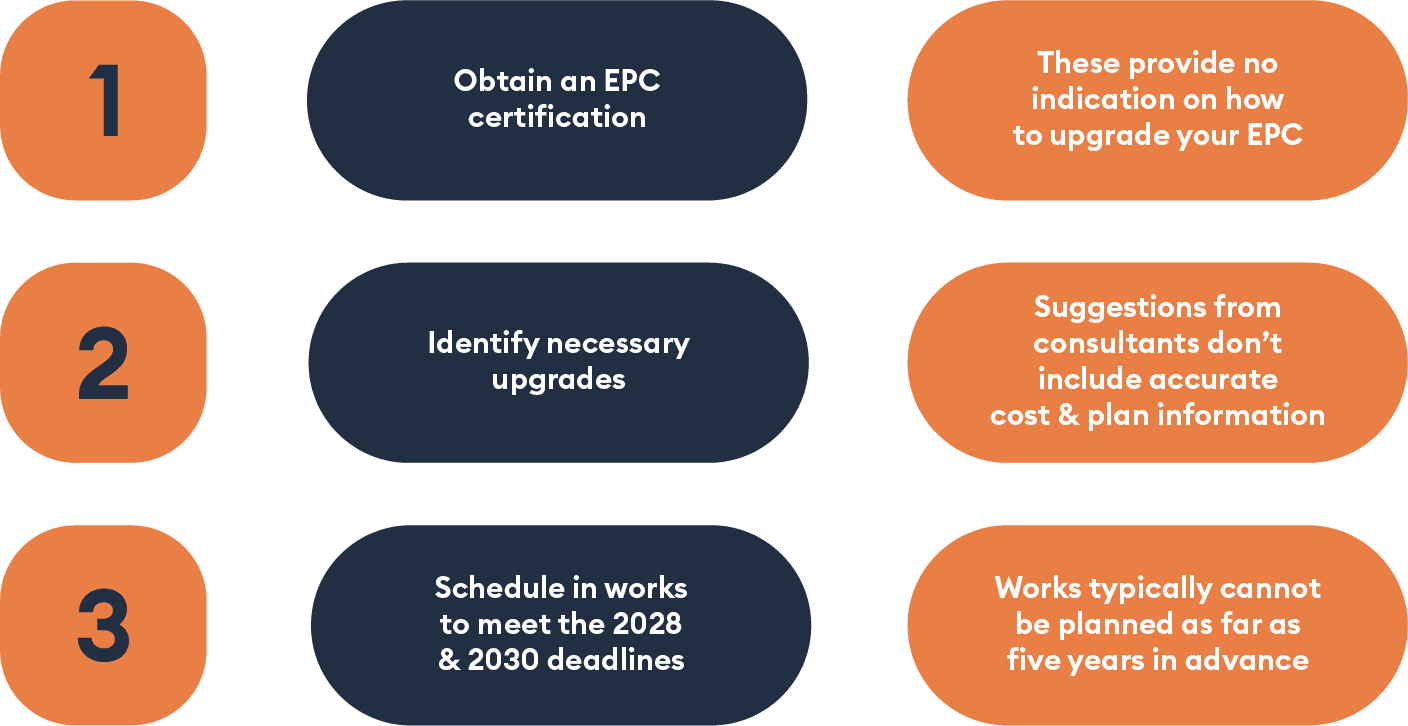Only an estimated 28% of UK commercial properties currently meet future minimum Energy Performance Certificate standards. With the government’s deadlines looming, is your property ready for the upcoming regulation changes or is it at risk of becoming a stranded asset? We provide EPC compliance works as part of our wider M&E offering.
Commercial EPC Compliance
Your Roadmap To Commercial EPC Compliance
What is an EPC?
An Energy Performance Certificate assesses a building’s energy efficiency using a standardised method and is measured on a scale from A-G. ‘A’ represents the highest efficiency, and ‘G’ the lowest. Property owners must obtain an EPC when selling or renting a property, completing new construction, or making significant modifications to heating, cooling, or ventilation systems. Once obtained, an EPC certificate is valid for 10 years.
What are the EPC requirements for commercial properties?
As of April 2023, the minimum EPC requirement for commercial properties is EPC ‘E’. However, these regulations are changing soon. By 2028, all commercial buildings will require an EPC of ‘C’ or above, and by 2030, the minimum requirement will be EPC ‘B’. In five years’ time, no building with a rating lower than EPC ‘B’ will be able to be leased or sold. Any non-compliant property will then become a stranded asset until the necessary changes are made.
Following the formation of a new UK Government in 2024, there has been speculation around potential changes to EPC deadlines for commercial properties. However, no official updates have been confirmed. As it stands, properties that do not meet a minimum EPC rating of ‘C’ by 2028, and ‘B’ by 2030, will not be able to be sold or leased.
Which commercial properties are at risk?
Any property used for commercial purposes that is leased or for sale will require the necessary upgrades. This includes commercial properties like:
- Offices
- Medical clinics
- Retail properties
- Shopping centres
- Retail parks
- Factories
- Warehouses
- Manufacturing facilities
- Warehouses & distribution centres
- Research facilities
- Hotels, hospitality & leisure properties
- Healthcare facilities
- Government buildings
- Educational buildings
- Event venues
- Transport infrastructure
How do commercial properties comply with the EPC requirements?
The reality is that there’s no one-size-fits-all solution for every building. In fact, the best route for most commercial properties is a series of individual building upgrades, which together enable a buidling to reach the necessary EPC target. Generally, these are the headline changes to look for:
Service Improvements
- Internal & external wall and roof insulation
- Double or triple window glazing
- Improved building sealing
Fabric Improvements
- LED lighting
- De-gassing services
- Solar PV, heat pumps, and alternative renewable energy sources
- Upgraded HVAC systems
Maintenance is essential for sustaining or improving an EPC rating over time. For support beyond initial certification, contact our Building Services & Maintenance team.
What's the roadmap for commercial EPC compliance?
While tools like our Hard Facilities Management Checklist can get you so far, many properties need much more attention. In principle, the roadmap to making a commercial property EPC compliant with the upcoming minimum requirements is fairly straightforward. The process can be split into three distinct parts:
1 | Obtain an EPC certification.
2 | Identify necessary upgrades.
3 | Schedule in works to meet the 2028 & 2030 deadlines.
However, there are obstacles at each stage that make obtaining an EPC for commercial property more complicated.
Obstacles to commercial EPC compliance:

It is a legal requirement for a building to have an EPC rating at point of sale or lease. So, it is likely most landlords and portfolio managers already have an EPC report. The problem is that very few of these reports provide a landlord or portfolio manager with specific information on how to upgrade their assets to comply with the various levels of EPC, let alone any cost or programme information.
How can Gratte Brothers help?
Our approach (shaped by our values) removes all these obstacles, providing a one-stop-shop for building compliance. We combine our building services and principal contractor expertise with precise cost and planning insights, using our consultant’s detailed survey—powered by IES software—to identify the best solutions for your property. You’ll then be equipped with all the information you require to plan out the works needed to achieve compliance in line with your budget and programme.
Not Sure Where to Start?
If you’re still unsure on how you can make your commercial property compliant, download our FREE guide to get you started.
"*" indicates required fields
